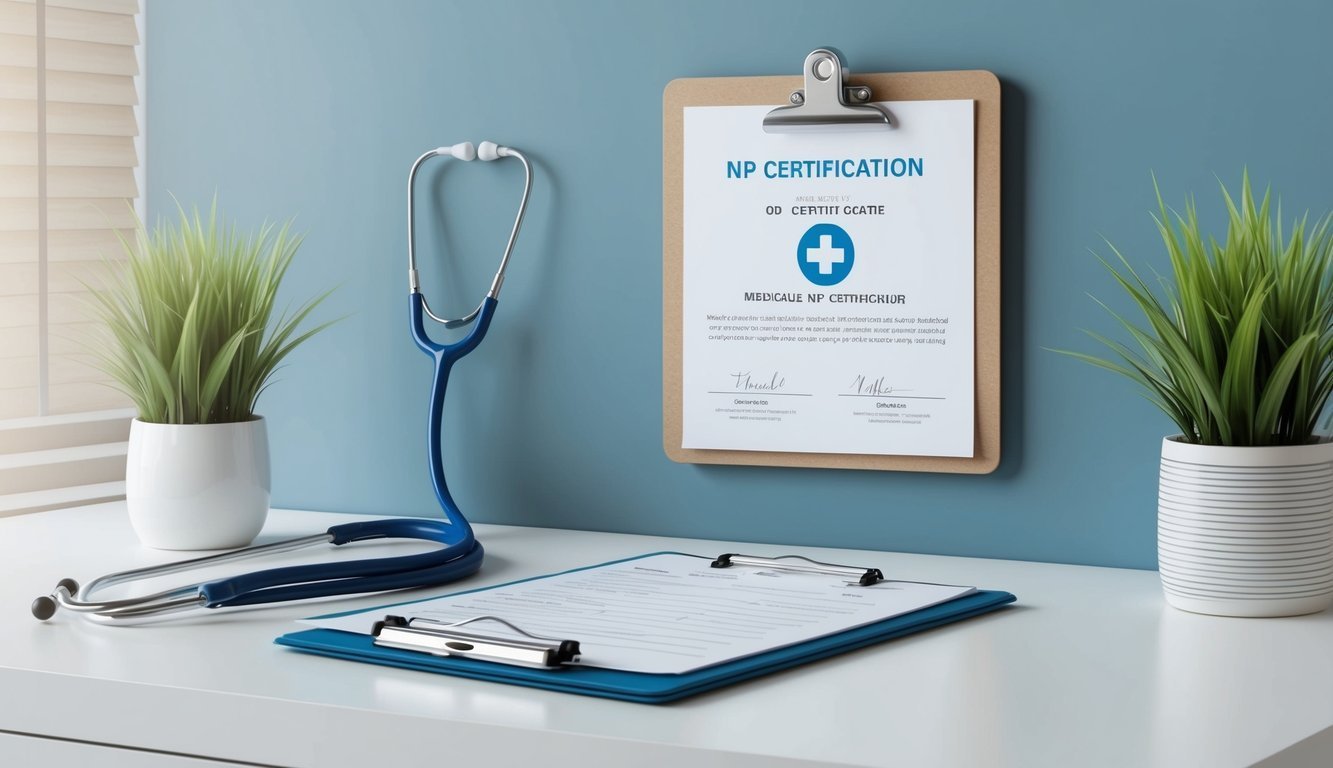Nurse practitioners (NPs) play a vital role in healthcare, providing quality care and making a significant impact on patient outcomes. Anyone looking to advance their nursing career and specialize in specific areas of healthcare must get NP certification. This certification not only validates your skills but also enhances your credibility as a healthcare provider.
The path to NP certification involves various steps, including obtaining the right education and training.
It is crucial to choose a certification body that is recognized and accredited to ensure that you receive valid credentials.
Knowing the requirements and the application process can make this journey much smoother and help you focus on your career goals.
As you explore the certification landscape, you will discover numerous specializations that can help you cater to your interests and the needs of your community.
Understanding how to navigate this process will empower you to achieve your professional aspirations and provide enhanced care to your patients.
Key Takeaways
- NP certification is necessary for advancing your nursing career.
- Choosing an accredited certification body is crucial for your credentials.
- Specializations allow you to focus on areas that interest you in healthcare.
Exploring the Role of Nurse Practitioners
Nurse practitioners (NPs) play a crucial role in healthcare, particularly in primary care settings.
Their scope of practice and responsibilities reflect their extensive training and certification process.
Understanding how NPs impact healthcare delivery can help you appreciate their value in the medical field.
Scope of Practice and Responsibilities
Nurse practitioners have a broad scope of practice that varies by state regulations.
They are trained to perform many tasks, including:
- Diagnosing illnesses
- Interpreting diagnostic tests
- Managing patient care
- Prescribing medications
In many cases, NPs focus on primary care, providing services similar to those of physicians.
They often work in various settings, including hospitals, clinics, and private practices.
According to the American Nurses Association, NPs are essential for addressing gaps in healthcare access, especially in underserved areas.
This allows them to improve patient outcomes through preventative care and health education.
Impact on Healthcare Delivery
Nurse practitioners significantly influence healthcare delivery by improving patient access and quality of care.
With more than 385,000 NPs licensed in the U.S., they help meet the rising demand for healthcare services.
Their role is vital in various ways:
- Increased patient access to care
- Reduced wait times for appointments
- Focus on preventive care and education
Nurse practitioners often work in collaboration with physicians and other healthcare professionals.
This teamwork ensures comprehensive patient care, addressing both physical and mental health needs.
NPs are also particularly effective in managing chronic conditions, providing personalized care that fosters better health outcomes.
For more information on how NPs contribute to healthcare, consider visiting the American Association of Nurse Practitioners.
The Path to NP Certification

Achieving NP certification requires a blend of education and successful completion of a certification exam.
This path includes meeting specific educational requirements and understanding the eligibility criteria needed for certification.
Educational Requirements
To become a Nurse Practitioner, you must first complete a Bachelor of Science in Nursing (BSN) and be a registered nurse (RN).
After obtaining your BSN, you need to pursue a master’s or doctoral degree in an NP program.
These programs often include essential coursework in health sciences, pharmacology, and clinical practice.
Most NP programs also require completing supervised clinical hours to develop practical skills.
When you finish your program, you will need to gather your official transcripts to provide proof of your education for the certification application.
More details can be found at AANP.
Certification Exam Details
After meeting the educational requirements, the next step is to pass a certification exam.
The exam you take will depend on your specialty, such as Family NP or Psychiatric Mental Health NP.
Each exam is typically a competency-based examination designed to test your knowledge and clinical skills.
The exam format usually includes multiple-choice questions, and you can expect to answer questions related to your area of practice.
To prepare, many candidates use review courses and study materials specific to their certification.
Ensure that you check the American Academy of Nurse Practitioners Certification Board for detailed information on testing and preparation resources.
Eligibility Criteria
Before taking the certification exam, you must meet specific eligibility criteria.
Typically, these include holding a valid RN license and providing documentation of your NP education.
You may also need to complete a certain number of supervised clinical hours as part of your training.
It is essential to review the specific requirements for your chosen specialty.
Every certification board has its unique criteria, so be sure to check your certifying body’s official guidelines.
This will prepare you best for a successful application and exam experience.
Certification Bodies and Accreditation
Certification bodies play a crucial role in ensuring that nurse practitioners meet the required standards.
Accreditation from recognized organizations further validates the certification process, ensuring quality and safety in healthcare.
American Academy of Nurse Practitioners Certification Board
The American Academy of Nurse Practitioners Certification Board (AANPCB) is a significant entity in the certification of nurse practitioners.
It offers a variety of certification programs, including Family Nurse Practitioner (FNP) and Adult-Gerontology Nurse Practitioner (AGNP) certifications.
Key Points:
- AANPCB has a strong focus on national certification.
- The organization is known for its rigorous examination standards.
- Their certifications are accredited by the Accreditation Board of Specialty Nursing Certification (ABSNC).
You can find more about AANPCB and their certification offerings on their official website.
National Commission for Certifying Agencies
The National Commission for Certifying Agencies (NCCA) plays a vital role in the accreditation of certification programs.
It is dedicated to ensuring that the certification processes used by various organizations meet robust standards.
Key Points:
- NCCA sets the standards for national certification.
- It ensures that certification programs are fair and reliable.
- Many nurse practitioner certification boards, including AANPCB, are accredited by NCCA.
For additional information on NCCA and its impact on certification, you can visit their website.
Application and Certification Process
The application and certification process for Nurse Practitioners (NPs) is crucial for advancing your career.
You will need to prepare thoroughly, submit your application carefully, and understand how to maintain your credentials afterward.
Preparing for Application
Before starting your application, gather all necessary documents.
This may include proof of education, clinical experience, and any required licenses.
It’s essential to create an Online Profile at the AANPCB website to access the application.
You can find more details on this application process here.
Consider the eligibility criteria for certification.
Ensure that you have completed an accredited NP program and have met any state licensure requirements.
You should also review exam content outlines to prepare effectively.
Submitting Your Application
After preparing, you can submit your application online.
Make sure to provide accurate information, as any discrepancies can slow down your application.
Once your application is submitted, it goes through primary source verification.
This ensures that your credentials are valid.
You might also need to pay a fee, which varies based on the certification program you choose.
Keep track of your application status through your online profile.
Patience is key, as it may take several weeks to process.
After Certification: Maintaining Your Credentials
Once you receive your certification, the journey doesn’t end there.
You need to maintain your credentials through ongoing professional development.
Continuing education (CE) is a vital part of this process.
Most certification boards require you to complete a specific number of CE hours every year.
Stay updated on renewal requirements, as they can vary by state and certifying board.
Visit the ANCC website for more information on maintaining your certification here.
Maintaining your skills and knowledge not only keeps your certification valid but also ensures you provide the best care to your patients.
Specializations and Advanced Certifications
As a nurse practitioner, you have the option to pursue various specializations and advanced certifications.
These credentials can enhance your skills and expand your career opportunities.
Specializations like Family Nurse Practitioner (FNP-BC) focus on primary care, while other certifications allow you to work in diverse fields such as gerontology and cardiology.
Family Nurse Practitioner (FNP-BC)
The Family Nurse Practitioner Certified (FNP-BC) credential is a key certification for nurse practitioners.
To qualify, you must hold a master’s degree in nursing and complete a nurse practitioner program.
After that, passing the certification exam is required.
FNP-BC professionals offer comprehensive care to patients of all ages.
You will handle various health issues, provide preventative care, and diagnose and treat illnesses.
This certification opens doors to multiple settings, including clinics, hospitals, and private practices.
For more details about FNP-BC certification, visit the American Nurses Credentialing Center.
Certification in Specialized Fields
In addition to FNP-BC, you may choose certifications in specialized fields.
These can include areas like gerontology, acute care, and mental health.
Each subspecialty typically requires specific educational requirements and clinical experience.
For instance, the Gerontological Nurse Practitioner Certification (GNP-BC) focuses on caring for older adults.
It demands at least 3,000 hours of practice and relevant education.
Other specialized certifications may cover areas such as cardiology, pediatrics, and oncology.
Each certification also requires passing a dedicated examination.
Pursuing these advanced certifications enhances your expertise and can lead to more job opportunities and higher earning potential.
You can check Nurse Journal’s Certification Guide for more detailed information on these options.
Frequently Asked Questions

This section addresses common questions related to Nurse Practitioner (NP) certification.
You will find details on eligibility criteria, preparation tips, certification differences, verification processes, and renewal requirements.
What are the eligibility criteria for Nurse Practitioner certification?
NP certification typically requires you to have a master’s degree or higher in nursing.
You must also have completed an accredited NP program that includes clinical hours.
Additionally, your program should prepare you for the specific patient population focus of your certification.
How does one prepare for the Nurse Practitioner certification exam?
Preparing for the NP certification exam usually takes 6 to 12 weeks.
It is important to develop a detailed study plan and stick to it.
Consider using practice exams and review courses to strengthen your knowledge.
You might find helpful resources at AANP.
What are the differences between the ANCC and AANP certification exams?
The ANCC (American Nurses Credentialing Center) and AANP (American Academy of Nurse Practitioners) certification exams both assess NP knowledge, but they differ in focus.
The ANCC exam is more theory-based, while the AANP exam emphasizes clinical practice.
Each has different passing criteria and test structures.
What is the process for verifying Nurse Practitioner board certification?
To verify your NP board certification, you can visit the website of the certifying body, such as the AANPCB.
You typically need to enter your credentials, like your name and certification number.
This process helps ensure you meet the standards required for practicing as a Nurse Practitioner.
How often must Nurse Practitioners renew their certification?
Nurse Practitioners usually must renew their certification every five years.
Renewal often requires proof of continuing education or practice hours.
Specific requirements can differ based on the certifying body, so it is essential to check the guidelines set by organizations like AANP or ANCC for precise details.
What are the requirements for maintaining certification as a Family Nurse Practitioner?
To maintain certification as a Family Nurse Practitioner, you need to complete a certain number of continuing education hours.
Typically, this includes 75 hours every five years.
You must also meet practice hour requirements and follow any additional regulations from your certifying body to stay current in your field.

